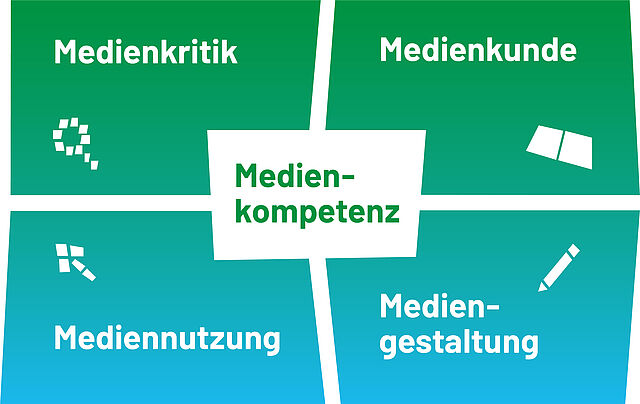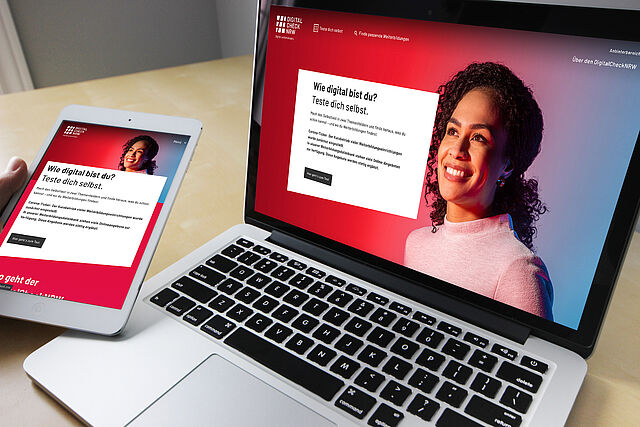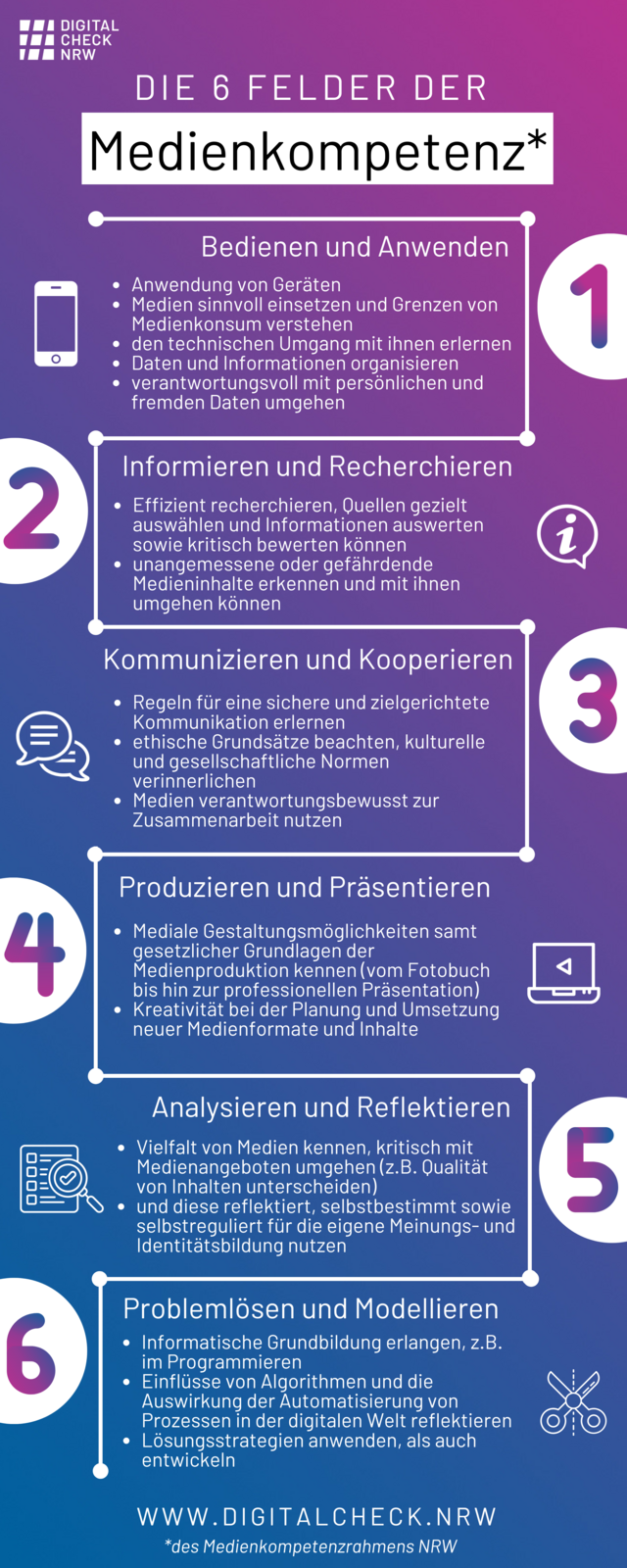Login
What is media literacy?
A concept with many facets
Article content at a glance
Media literacy means using media critically, creatively, safely and responsibly .
It includes technical skills, information evaluation, data protection, media design and digital behavior.
The aim is to develop a reflective approach to media in everyday life.
The #DigitalCheckNRW offers a free online test to check and specifically improve your own media skills.
Definition: What does media literacy mean?
Media literacy describes a self-determined, critical, creative and socially responsible approach to media.
The educationalist Dieter Baacke († 1999) divided media literacy into four areas: Media Criticism, Media Studies, Media Use and Media Design ("Bielefeld Competence Model"). There are now various concepts for defining the term, but the key points are similar everywhere: media literacy means not only the passive, consumptive use of media, but also the critical and reflective use, as well as active and creative work with media.
But what exactly does that mean? What do I need to be able to do to be considered "media literate"? Are some skills more important than others? How can I check how high my media skills are? And how can I improve them?
All have media skills
Have you ever sent a message via a smartphone? Digitally edited a picture? Asked yourself whether the content of a news article is true? Have you ever hesitated when opening an email because you weren't sure whether it was pure advertising? Or changed the notification settings of an app so that you are not informed of every news item?
If you can answer yes to one or more of these questions, then you already have important media usage skills.
Media literacy means more than just operating devices; it also includes critical thinking when using media, the creative design of media content and knowledge of how different content is used for political, economic or other purposes.
It also includes a basic understanding of what new technologies can be used for and how they work. A person who cannot use a smartphone at all, but regularly scrutinizes TV news, certainly has media literacy, but has deficits in some areas. The more knowledge and skills you have in the various areas, the more independently and responsibly you can use your devices, communicate with others, expand your knowledge base, recognize potential danger spots and integrate practical digital tools into your everyday life.
What areas of media literacy are there?
Each area of competence is important for overall media literacy, so it is important to acquire various basic skills across different areas, which can be further developed later depending on your interests and needs:
Digital devices
You should be able to operate different digital devices and applications, e.g. smartphones, tablets and laptops or email service providers, messengers and browsers, so you can keep up with the advancing digitalization in different areas of life and are not limited to just one device or program.
Digital tools
It is useful to know which digital tools are available in everyday life so that you can benefit from their advantages and identify your own preferences. These include, for example, various apps for communicating, collaborating and everyday use:
- digital calendars and notepads,
- interesting offers that match your hobbies,
- websites where you can book train tickets or reserve hotel rooms, etc.
- There are lots of great things to discover! However, you should also assess the usefulness of these offers with a healthy dose of skepticism.
Media production
It is important to understand how media and programs are produced and how humans and machines interact with each other in order to recognize mutual influences. This includes, for example, knowledge of how algorithms work and the ability to recognize when texts, images and videos may have been created by artificial intelligence (e.g. programs such as Midjourney or ChatGPT).
News and fake news
You should be able to correctly classify and evaluate news from the media in order to find suitable, high-quality information and research it effectively. To do this, it is important to know how to recognize trustworthy sources in search engines as well as fake images, videos and texts or even advertising. This way, you can avoid manipulation and artificially generated opinion mongering.
Cyber security and data protection
Protecting your own privacy and handling other people's data responsibly is essential in a digital society in order to respect the fundamental right to informational self-determination. In addition to technical protection measures on your devices, it also helps to know what scams there are and how strangers can potentially gain access to your data.
Media creation
It is helpful to know how you can produce and actively shape media content such as images, videos and texts yourself. Producing new content and media yourself helps you to actively and creatively contribute to society, develop new interests and stay in touch with other people.
Digital communication culture
Even if it is not always easy, you should understand the connections between social interaction and digital communication culture and stay informed about current trends in order to recognize potential sources of danger at an early stage (e.g. personal, social and economic risks).
Media consumption
It is important that you reflect on your own media consumption (e.g. duration and content) and regulate it independently in order to ensure your digital well-being and find a balance between media and non-media activities.
When are you sufficiently competent?
New technologies, devices and programs always bring new challenges, opportunities, but also potential dangers. Even individual programs, such as apps that can be used to communicate, can have an impact on a social or political level. For example, TikTok or Instagram have influenced the way we deal with photos and videos, video conferencing has changed professional collaboration and household appliances controlled via the internet have restructured many people's everyday lives.
If you still see room for improvement in your media skills, then you are like many others. As the media landscape is changing and evolving rapidly, everyone is required to keep their knowledge and skills up to date when it comes to consuming and using media.
Whether a person is still very young or already at an advanced age makes no difference. However, the starting points for what still needs to be learned or improved can differ greatly. The way devices are used (e.g. which devices are used, for how long and for which activities) is also very individual and therefore presents different challenges.
The most important thing is to always remain open to new topics relating to media use and digitalization, then many new skills will be added automatically over time.
How can I specifically test and expand my media skills?
There are many further education institutions and media education organizations that offer media literacy training. Various offers on the Internet can help you find your way around this broad field, order training materials and find reading tips.
Test your media skills #DigitalCheckNRW
One of these offers is the #DigitalCheckNRW, a project of the Gesellschaft für Medienpädagogik und Kommunikationskultur e.V. (GMK), which is funded by the state government of North Rhine-Westphalia.
On the competence and knowledge platform www.digitalcheck.nrw, everyone can check and expand their digital media skills. The #DigitalCheckNRW is an easily accessible and free self-test that helps users to assess their own knowledge and existing skills in the field of digital media as a first step. Users can also find suitable training courses in an extensive database - either locally or online. The website also offers lots of other content, such as explanatory videos, info texts and method sheets on current and everyday digital topics.
The online test is based on the tried-and-tested NRW media literacy framework, which was initially developed for schools and has now been made usable for adults in order to promote media literacy and media education at every stage of life.
Based on the media literacy framework, the test covers various areas of competence (see infographic on the right).
Are you up to date in the area of media literacy?
The 6 fields of media literacy
according to the NRW media competence framework
1. operate and use:
Know the range of functions of digital tools (various devices and applications), use media sensibly (also understand the limits of healthy media consumption), learn how to use them technically, organize data and information (e.g. create folder structure and recognize/delete spam emails) and handle personal and third-party data responsibly (both in terms of data protection law and ethics).
2. informing and researching:
Being able toresearch efficiently, select sources in a targeted manner, evaluate and critically assess information (e.g. a reflective approach to search engine results) and recognize and deal with inappropriate or harmful media content (in relation to fake news and disinformation, but also when dealing with violence, hatred and bullying).
3. communicating and cooperating:
Learn rules for safe and targeted communication (e.g. appropriate quantity and quality of messages and the use of secure and data-saving programs), observe ethical principles, internalize cultural and social norms and use mediaresponsibly for cooperation (e.g. in an appropriate communication style).
4. producing and presenting:
Knowmedia design options including the legal basis for media production (from photo books to professional presentations) and use these creatively when planning and implementing new media formats and content.
5. analyze and reflect:
Know the diversity of media (e.g. the effect of different formats), deal critically with media offerings (e.g. differentiate between the quality of content) and use them in a reflected, self-determined and self-regulated way to form their own opinion and identity .
6. problem solving and modeling:
Acquire basic computer literacy, e.g. basic programming skills to understand how information technology works, reflect on the impact of algorithms and the effect of automating processes in the digital world (e.g. recognize and distinguish the consequences of good or bad technical solutions) and be able to both apply and develop solution strategies.
Further information
(Please click on offers for further details)
Digitalakademie Bund
The federal government's platform for digital training - The Federal Digital Academy supports the federal administration in its digital transformation with state-of-the-art training measures. However, the learning videos available there are not only of interest to administrative staff. They offer an exciting insight into many areas of the digital world. → to the offer
Digital-Kompass
A wide range of services to promote the safe and confident use of digital media and devices. The offers and advice take place at nationwide meeting points or online. A project of the Federal Working Group of Senior Citizens' Organizations and Deutschland sicher im Netz e.V. → to the offer
Frag ZEBRA
"ZEBRA is a service offered by the NRW Media Authority. Here you will receive concrete and individual support within a maximum of 24 hours for all media issues that you encounter in your everyday digital life. We always treat your concerns confidentially." (Info text from ZEBRA) → to the offer
iRIGHTSinfo
An information service on the subject of copyright: differences in licenses for texts, images and music, information on file sharing and streaming, general terms and conditions and contracts, quotations and plagiarism, data protection and IT security, as well as tips on how to avoid and deal with warnings. → to the offer
Innocence in Danger
An initiative that offers various projects and materials on topics related to sexualized violence in the digital space. → to the offer
Klicksafe.de
An EU-funded initiative that provides educational media material for various target groups, e.g. children, parents and teachers. The formats also range from worksheets to explanatory videos or accompanying material for educational professionals. → to the offer
Landeszentrale für politische Bildung Nordrhein-Westfalen
The State Center for Political Education offers a wide range of information. The "Digital media" section covers topics such as digital democratic competence, digital civil courage and artificial intelligence. There is also a very informative mini-game on the topic of "Big Data". → to the offer
Medienbox NRW
A project to support learning audio and video production offered by the NRW Media Authority. → to the offer
Medienkompetenzrahmen NRW
The support portal provides information, tips and materials on the NRW media literacy framework and on creating a media concept. You can find out about teaching ideas, event information and the latest tips on the subject of media literacy. You will also find projects and contact persons for extracurricular educational offers. → to the offer
Medienbildung in Bibliotheken
As part of its BMBF project "Network Library Media Education", the German Library Association (dbv), with the support of the JFF - Institute for Media Education, has published a comprehensive online platform for media education in libraries. The digital network academy for libraries includes low-threshold self-learning tools for media education workshops on topics such as digital storytelling, video and gaming in libraries. → to the offer
Medienpädagogik der Vielfalt
Transferring files from one device to another, sending photos in a legally compliant way, creating QR codes: The Gesellschaft für Medienpädagogik und Kommunikationskultur (GMK) offers lots of tips and tricks on these and other topics. → to the offer
Newstest
About the project: "With this digital self-test, you can check your skills in dealing with news on the Internet. You will be asked questions. You will also be shown news items and claims that you have to assess or evaluate. Our aim is to draw attention to the skills you need when dealing with news. And: to show people in which areas they are already well versed and in which they can still improve their skills." (Info text from Newstest) → to the offer
PIKSL-Labor
PIKSL brings people with and without disabilities together to realize innovative ideas through inclusion. PIKSL stands for "Person-centered interaction and communication for more self-determination in life". → to the offer
Polizei für dich
An information page on many topics relevant to criminal law. The "Security in everyday media life" section, for example, deals with cyber risks, copyright and the right to one's own image. A service provided by the state and federal police crime prevention services. → to the offer
Switching.software
This page provides information on which software actually belongs to which provider and which free, data-saving alternatives are available. The offer is only available in English, but the design is very intuitive and the names of the programs can also be understood by people who do not speak English. → to the offer
Toneshift (Netzwerk gegen Hass im Netz und Desinformation)
The Network Against Online Hate and Disinformation (now: toneshift) is an association of six established organizations that are committed to combating hate speech, violence in the digital space and disinformation: NETTZ, Gesellschaft für Medienpädagogik und Kommunikationskultur, HateAid, the Institute for Democracy and Civil Society, the Respect! hotline and Neue deutsche Medienmacher*innen. Toneshift - the network against online hate and disinformation is a central point of contact for anyone who needs guidance, is looking for help, wants to get involved, report on it or learn more.→ to the offer
Sources
Dieter Baacke Prize: https://dieter-baacke-preis.de/ueber-den-preis/was-ist-medienkompetenz/
Media Competence Framework NRW: https://medienkompetenzrahmen.nrw/


